Wait, don’t hang up, Tor.com! Do you find yourself lurking in shadows, memory gone, wondering if anything around you is real?
Well then, you’ll fit right in with this post, for today’s Movie Rewatch of Great Nostalgia covers one of my personal faves, 1998’s dark and twisty neo-noir offering of Dark City!
Previous entries can be found here. Please note that as with all films covered on the Nostalgia Rewatch, this post will be rife with spoilers for the film.
And now, the post!
ME: So, what do you know about Dark City?
LIZ: Um. That there’s… a city. And… it’s dark?
ME: Ehhxcellent.
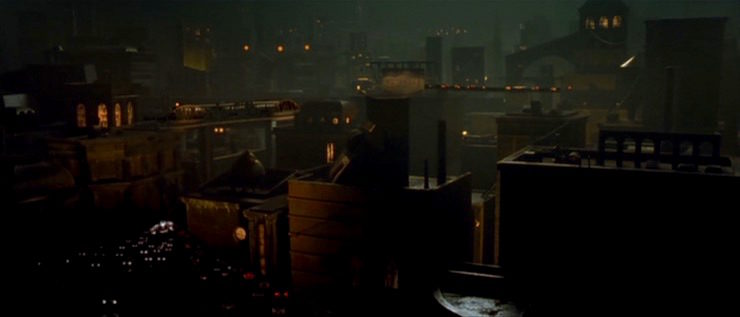
Yes, so before we begin, I have a heartfelt plea: if you have not already seen Dark City, please please PLEASE watch it before you read this post, because I am going to spoil the hell out of it, and you really don’t want to spoil yourself for this movie if you can avoid it. Going into this movie unspoiled was one of my favorite cinematic experiences of the 1990s, so if you have managed to remain unaware of Dark City’s plot till now, do yourself a favor and keep it that way until you have a chance to watch it. Sister Liz, clearly, is one such person, and so this viewing of the movie was her first. I was terribly excited to see what she thought of it.
(Sister Kate will not be joining us for this one; we looked at the manic eleventh-hour maid-of-honor-duty wedding madness in her eyes and wisely backed away let her off the hook this go-round.)
Concurrent to that plea: if you can possibly arrange to watch the director’s cut of this movie instead of the theatrical release, please please do that too. Remember how I complained about the plot-twist-destroying placard at the beginning of Logan’s Run? Well, the theatrical cut of Dark City has one too, in voiceover form, and its cat-out-of-bagging is about ten times worse than Logan’s Run, if you ask me. The director’s cut, on the other hand, doesn’t insult your intelligence and is just generally better than the theatrical cut, which just goes to show you that not all director’s cuts are created equal.
Got all that? Good, off you go.
Back? Yay! Let’s reminisce! About the movie you possibly just saw five minutes ago for the first time!
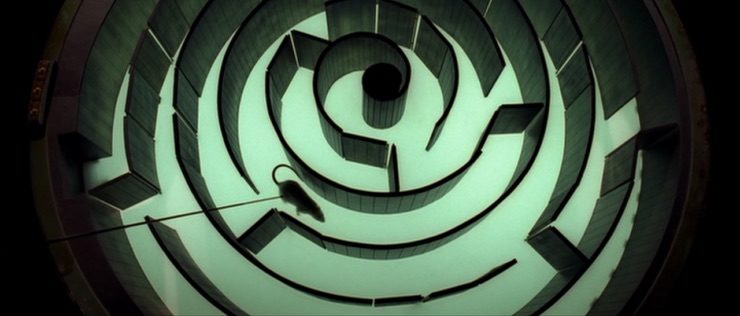
Now, you may be like, why do you love this movie so much, Leigh. It didn’t do all that well at the box office, and hasn’t really seemed to develop a cult following since it came out in 1998. And usually, at least one of those two things is necessary for an SF movie to be considered Important to the genre.
Well, first of all, I answer, Shirley you have noticed by now that the SF things I adore, especially as a young ‘un, do not necessarily bear any relation to whether or not they were popular in the mainstream, because pfeh. And secondly, there were some very particular aspects to this film that were practically tailor-made to delight my secretly dark and twisty inner moppet moviegoer. And lastly, I think Dark City was a lot more important to the SF genre than most people realize.
A thing you should know about me if you don’t already is that I am a huge, huge fan of the in medias res style of storytelling. I absolutely love when a story throws you into the middle of a confusing but fascinating situation and gradually clues you in, like you’re discovering the story instead of being told it. (It should probably surprise no one, given this, that Myst and its ilk are my absolute favorite kinds of games to play.)
I feel that when done well, in medias res stories engage and invest the viewer/reader in a way that almost no other narrative technique can match. And Dark City (or at least the sans-stupid-voiceover version of it) is a quintessential example of an in medias res story.
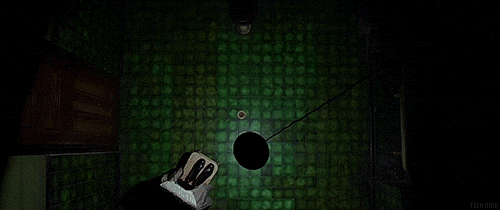
We begin knowing just as much about what’s going on as our protagonist John Murdoch does, which is to say, not a damn thing. (Delicious.) And so we follow right along with him as he slowly uncovers layer after layer of his situation, from the already disturbing surface interpretation (that John is a psychotic serial killer with amnesia), down to the far weirder truth behind that (that John—and everyone else in the city—is an unwitting lab rat for parasitical aliens), all the way down to the freakiest truth of all (that John has the ability to defeat the aliens with their own powers).
Very onion-like, this movie is, and I heart it. And it certainly doesn’t hurt that the “tuning” power John shares with the aliens is basically telekinesis turned up to 11, and we already know how much I adore stories about psychic phenomena. So really it would have been odder if I hadn’t loved this movie, all things considered.
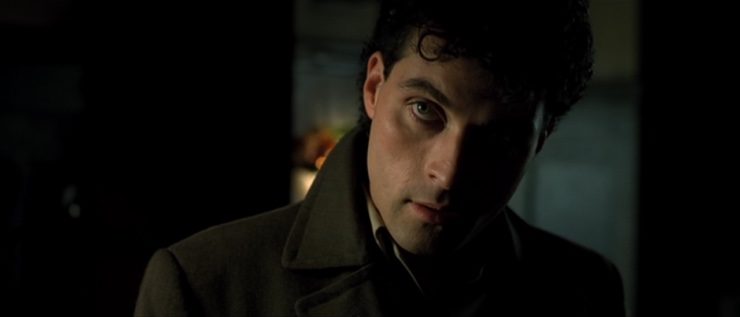
The other thing to love (mostly) about this movie is the cast.
I have always very much enjoyed Rufus Sewell as an actor, and this movie is the reason. Most of the time he plays villains, and he is undeniably skilled at it (to the point that I nominated him to play the Second Biggest Big Bad in the nascent Wheel of Time TV series), but what I loved about his casting in this movie is that his character John Murdoch had to be ambiguous. Especially at the beginning, John had to be believable to the audience as either the hero we’re rooting for or, possibly, the remorseless killer we want stopped, and Sewell rode that line wonderfully, in my opinion.
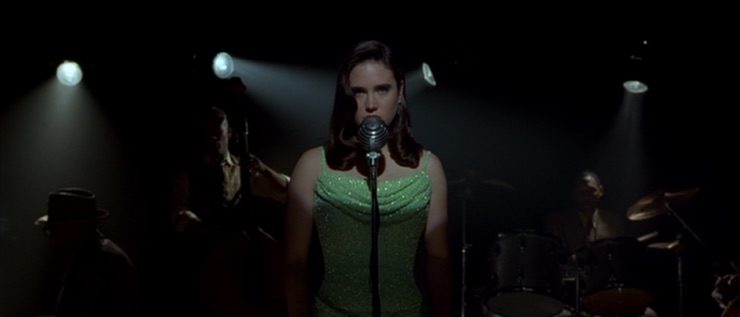
And Jennifer Connelly was perfect, as far as I’m concerned. Not only for her eerily exquisite beauty (seriously, that much gorgeousness in one person verges on the freaky), but in the effortless way she exuded Emma’s quiet melancholy and subtle confusion at living a life she senses, however dimly, isn’t really hers. Jennifer Connelly is, in my opinion, one of the most consistently underrated actresses alive, and her brilliantly understated performance in Dark City is a great example of why.
Interesting tidbit: in the theatrical cut, Connelly’s voice is dubbed over in her singing scenes by Anita Kelsey. And the thing is, I get why, because Kelsey’s voice is lovely, and I actually quite like her cover of both songs in the film. But Liz and I both agreed that it was much better that the director’s cut kept Connelly’s own voice, even though she is not quite as good a vocalist, because the whole point is that Emma isn’t a lounge singer; she just currently has memories that tell her she is one. You can even see it in Connelly’s body language, how Emma doesn’t quite look comfortable up on stage the way a seasoned performer would. (Did I mention she’s brilliant?)
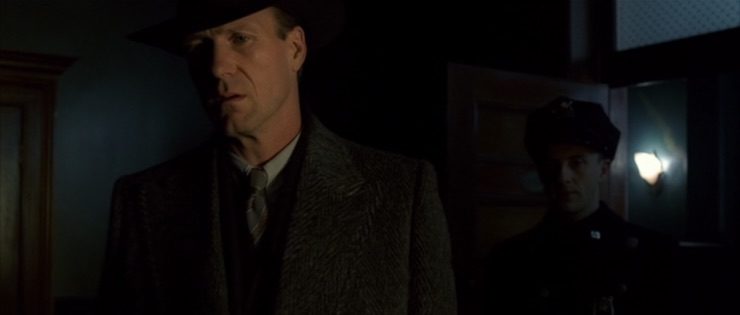
Also effortlessly brilliant is the ubiquitous William Hurt, who seems to be in everything, and makes everything better for it. His Inspector Bumstead takes the noir stereotype of the world-weary hard-boiled detective and infuses him with a strangely gentle air of grief that gives the character a lovely depth and humanity. The scenes he and Connelly have together are almost enough to break your heart without either of them even needing to say a word. Sheesh.
And then there’s Kiefer Sutherland.
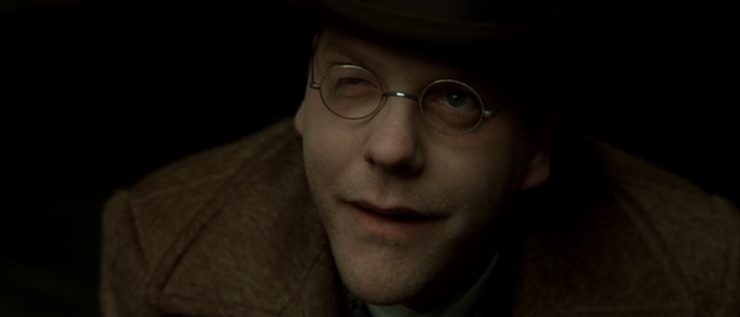
Don’t get me wrong, I love me a Kiefer even when he’s in objectively terrible projects (or busy promoting torture as a viable anti-terrorism tactic), but his Dr. Schreber in Dark City was one of his less awesome efforts, I think. Liz comments that she wouldn’t have minded the Igor vibe so much if they hadn’t also made him the infodump character. You do have to wonder about the choice to give the character with by far the most lines in the film a speech impediment.
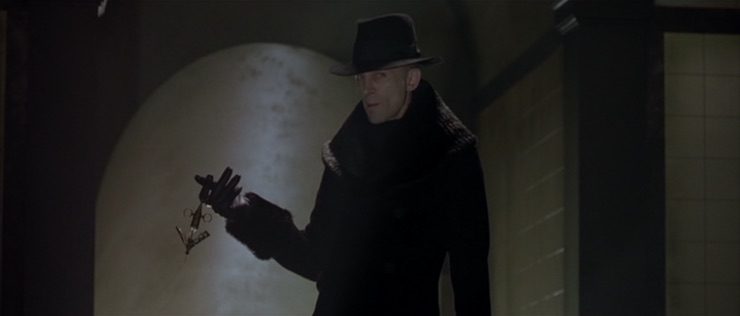
ME: He’s just a jump to the left!
Yeah, so, in more fun trivia, that is indeed Richard O’Brien of Rocky Horror Picture Show fame as main-ish bad alien guy Mr. Hand. Wikipedia claims that director Alex Proyas in fact based his design for the Strangers on O’Brien’s character Riff Raff in Rocky Horror, long before O’Brien was actually cast in the role. So that’s fun, and in general the actors all did a great job of making their characters complement the world they inhabited.
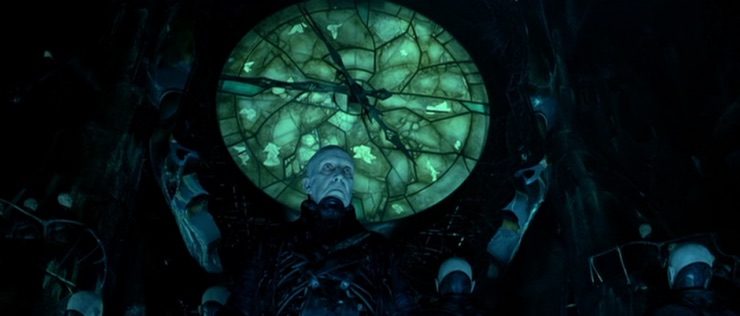
And the world they inhabit is a pretty darn disturbing one. The more you think about it, in fact, the more disturbing it becomes. Like, how long have the human guinea pigs been in the city? The production design is a (deliberate) mishmash of various periods of the twentieth century, but for all we know the aliens could have abducted the humans many centuries ago, and have been playing with them on their fake mini-planet ever since. Eesh.
John Murdoch’s good/evil ambiguity by no means stops with the revelation that he is not a serial killer, either. The Kiefer Lifetime University memory implant gave John the knowledge of how to defeat the Strangers, but it seems that Dr. Schreber didn’t quite think about the implications beyond that point.
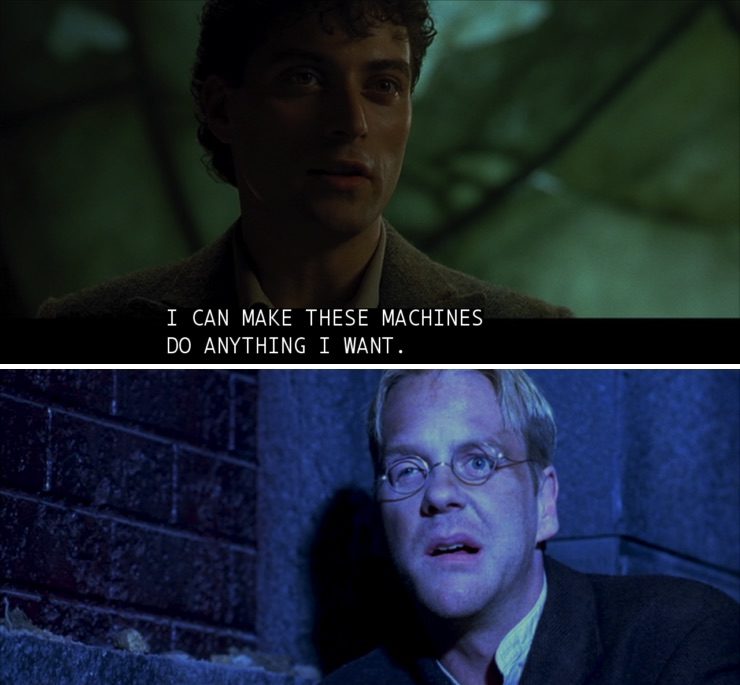
LIZ: Yeah, he should have maybe thought about how he was creating God.
Seriously. Because, yeah, we only see John do good things with his phenomenal cosmic power at the end of the film, like fix the buildings and make the sun rise and give Anna/Emma a beach, but the potential for abuse there is endless, and it’s really a pretty dark, ha ha, ending if you consider the deeper implications of it.
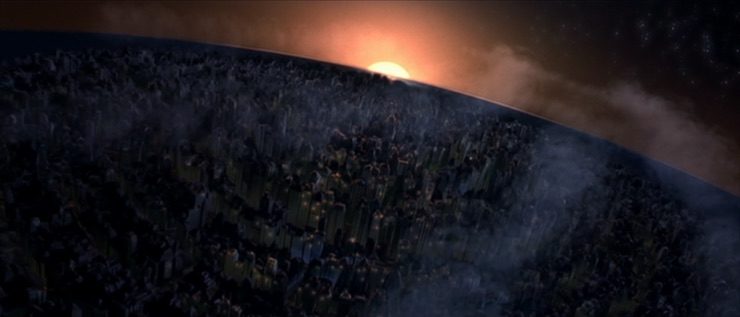
But maybe it was all of a piece, and meant to be that way, because the other other thing to love about this movie is that it is visually and aesthetically united in awesome.
The production’s devotion to the harmony of the film’s atmosphere, through color palette, lighting, camera filters, set design, costumes, everything—is just spectacular, in my opinion. Even more so when you consider what a mélange of influences Dark City’s director Alex Proyas was drawing upon to create the film’s look. Everything from the stark German Expressionism of 1927’s Metropolis to the shadowy allure of World War II-era film noir to the grim urban despair of Terry Gilliam’s Brazil to the macabre moodiness of The Twilight Zone to even the demented stylizations of Tim Burton are in there, all blended together into something we instantly recognize but have never quite seen before.
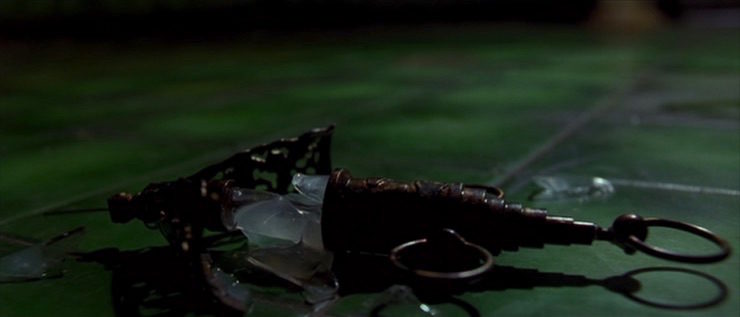
LIZ: It’s something I recognize from a lot of stuff that came out after 1998, too.
True. It’s been noted more than once the similarity of Dark City’s aesthetic to that of The Matrix, which came out a year later. In fact, The Matrix used several of Dark City’s sets: the staircase Inspector Bumstead chases John down, for instance, is the same one where Neo saw the déjà vu cat.
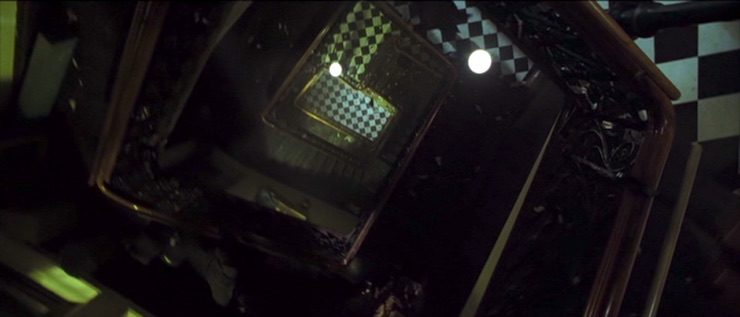
You can see Dark City’s influence in a lot more than just the Matrix movies, too. Christopher Nolan has said that the film was one of his inspirations for Memento and what would eventually become Inception, and I’d be very surprised if the folks behind Sin City weren’t fans as well. Other later SF films like The Thirteenth Floor, Minority Report, and Equilibrium may not have drawn inspiration directly from Dark City, but if they didn’t then they drew on The Matrix, which was etc.
LIZ: That was a cool thing, but it was also sort of a drawback, too.
Which is something many of you may be thinking as well. The problem for Liz was that, having seen The Matrix and Inception and all the other things that came after Dark City before seeing Dark City itself, the impact of the film was a bit blunted for her. Sort of like (on a much larger scale) watching Citizen Kane three quarters of a century later and not getting why it was such a big deal, because literally everyone since then has used and improved upon the filmmaking and storytelling techniques it pioneered.
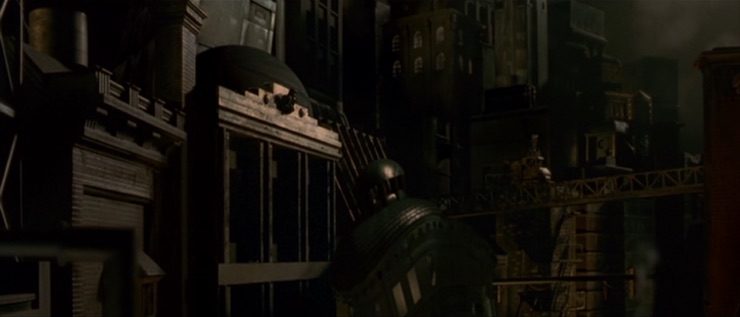
LIZ: I can see why those later films did better than this one, because they took what Dark City did and expanded it. Like The Matrix took it and went to the next level with the action, and Sin City went to the next level graphically—
ME:—and Memento went to the next level of mindfuckery—
LIZ: Right, and so on. Dark City was really good, but because I’d seen all those movies first, it just wasn’t quite as impressive.
I admit I pouted a bit about that, but then I was lucky enough to see Dark City and all those other films in the “right” order, so I suppose I can’t necessarily expect Liz or anyone else who didn’t to have the same affection for it that I do. However, I do hope that after this you understand why I love it so much, and why I think it deserves a place of honor in the SF movie genre—for how much it influenced those that came after it, if for no other reason.
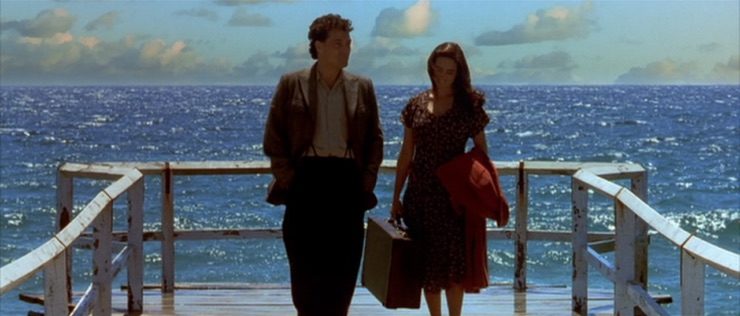
And that’s what I got for this one! Which means it is time for our nearly-as-ubiquitous-as-William-Hurt Nostalgia Love to Reality Love 1-10 Scale of Awesomeness!
For Liz:
Nostalgia: 0, because duh
Reality: “I give it a solid 7”, she says. Sigh.
For me:
Nostalgia: 9
Reality: 9.5
And now, tell me your thoughts, I want to hear them! Talk amongst yourselves, and then come back in two weeks for another MRGN, ya heard me? Cheers!










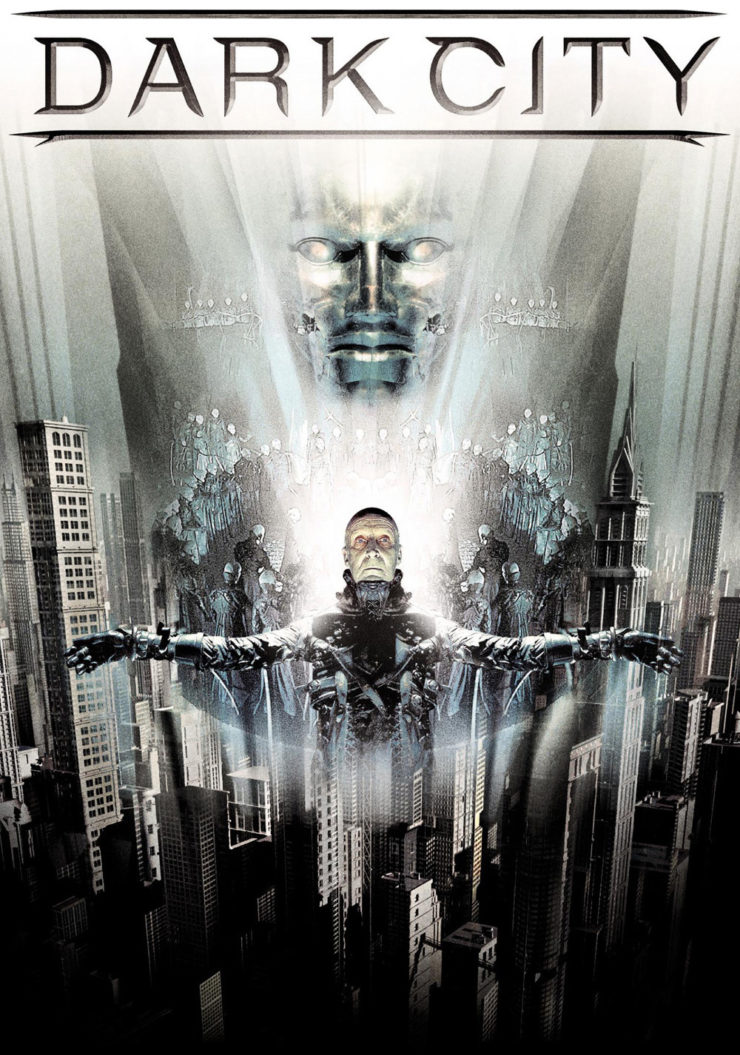
I haven’t always agreed with your opinions of MRGN films, but we’re very much on the same page where Dark City is concerned. I was always impressed by it, even in the original dumbed-down version, and the director’s cut is even better. I wouldn’t call it perfect — it’s a bit cartoonish and over-the-top in some ways — but it’s a striking, innovative film that I think any genre fan (including the noir genre) should see. I also agree entirely about Jennifer Connelly.
I once had the thought that the premise of Dark City could’ve been the basis for a TV series back in the ’60s-’80s, when a lot of shows favored a pseudo-anthology approach with continuing characters adopting different personas every week — whether because they were on the run, like Richard Kimble of The Fugitive or David Banner of The Incredible Hulk, or because they were undercover, like the Mission: Impossible team, or because they were genuinely shifting between different people’s lives, like Sam Beckett of Quantum Leap. A Dark City series could’ve been sort of like Joss Whedon’s Dollhouse writ large — the entire continuing cast (aside from the Strangers) would have different lives and identities every week and act out different episodic stories each week, with the Strangers observing and manipulating events. Maybe the characters would have consistent personality traits that would show through every superimposed identity, and maybe one or more of them might retain some fragments of memory and have a developing story arc, although that would be more likely for an ’80s show than a ’60s or ’70s show. If it were a modern show, the “anthology” approach would pretty quickly give way to a more overarching serial narrative. But it’s almost tailor-made for the ’60s/’70s preference for shows that were essentially anthologies but used continuing casts, because the lead characters would actually believe they were different people every week.
I have no idea when I first saw Dark City, but I do remember that I happened across it on network television and could not take my eyes off of the screen. I adore this movie, odd characters (hi Kiefer), and exquisitely layered storytelling. It is one of the very few films that, should it happen to be on a channel I cross when surfing, automatically elicits a stop, sit down, and WATCH.
Bravo. Nostalgia = 11.
I too love Dark City. I seem to recall at the time the sci-fi fan/film intelligentsia feeling that it was too derivative of The City of Lost Children. Having seen both, I never thought that held much water. The charge could however explain why Dark City didn’t get that cult status, as the people who make things cult status were already down on it.
Love this movie, even back in it’s original form. I find new stuff on every rewatch. The climax is almost Biblical in its imagery.
I fucking love this movie and have ever since I saw it (in theaters) back then.
Also, a movie I watched in college is not permitted to be nostalgic. Wait, shit.
Always loved Dark City. I was also fortunate enough to have seen the movies in the “correct” order. I don’t think I’ve seen the director’s cut, though. I’ll have to hunt that down.
I have not seen this since its theatrical release and am glad to hear that there’s a director’s cut. I’ll definitely have to check that out. I very much enjoyed it, but I recall being annoyed by the fact that throughout the entire movie, the camera doesn’t seem to hold any single shot for more than 3 or 4 seconds. I found this so distracting that I started counting. I was never sure whether to attribute this to Proyas’s background as a music video director or if it’s intentional, meant to reflect the fractured nature of memory and perception in this world. Anyway, I wonder if this is any different in the director’s cut.
When Dark City was screened at Bucconeer, the 1998 WorldCon, the presenter explained the voiceover problem and said they’d be accordingly keeping volume set to zero until Kiefer Sutherland’s character pulls out and looks at a pocket watch, and he recommended we advise all first-time viewers to do likewise (if necessary with earplugs). And that we’d thank him later. We did.
Jennifer Connelly is just flat out stunning here.
This is hands down my favourite film. I didn’t see it in the cinema, I rented it from blockbusters. I’ve a terrible memory so I don’t remember watching it for the first time but I’ve continued to love it all the same.
I got the directors cut as soon as I learned of it and it is much better. There are a wealth of extras on this version, well on both versions really, if you put in the director’s cut disc it will give you the option of either version and each has its own extras. Both have several commentary’s – director’s, writers, production designer’s, even one from critic Roger Ebert who named it his film of the year, oh and a fact track version too. There is also a brief text blurb by Neil Gaiman, an eleven page comparison to Metropolis, the theatrical trailer, production gallery, and three documentaries. The director’s cut has expanded/new scenes and omits the terrible spoiler voiceover intro. The only thing that I dislike from the dc is the changing of schrieber’s line as he injects John at the end, it was pretty cool the way he declares that he “has other plans” but they cut the line to make him seem more ambiguous right up until the end.
I loved Kiefer in this too, it was very refreshing to see him in such a completely different role to his normal typecasting and he pulled it off so well (though I believe he thought at first that the script must have been sent to the wrong Sutherland). I also have the soundtrack, though It only contains the Anita Kelsey versions of the songs. ‘You have the power’ is a particularly awesome track played during the climax of the film. (fun fact, this piece was used as background music in the lightsaber duel viral video from ten or so years ago – Ryan vs Dorkman, even funner fact one of those guys went on to work on The force Awakens).
Let’s see, what else… Oh yes, on the subject of The Matrix you may want to check out A Detective’s Story from the Animatrix and compare it to the story of William Hurt’s Inspector Bumstead. I can’t remember if the former was directly based on the latter but you can’t deny the similarities. I’ve also heard recently that Dark City was a huge influence on the Bioshock games, the City of Rapture is very much in the image of the Dark City.
I’ve tried lending this film to a few people over the years but it’s never had much of an impact on them unfortunately (except my sisters).
For fans of this film though there are a few youtube videos that you may find interesting – there is Oliver Harper’s retrospective/review video https://youtu.be/nI8Nuonma0I and this video that I was directed to by someone on another article here some months ago (can’t remember which or who I’m afraid) skip to 40:55 (if the link does not) https://youtu.be/dIR6isxycio?t=40m56s
PS, any chance these nostalgic rewatches will cover The Rocketeer at any point?
Another great nostalgia film with Jennifer Connelly.
When I first saw this movie, my response was: “Well that sucked.” However the more I thought about the movie, the more it grew on me. Eventually, I had to buy it on video. Now I think of it as one of my favorite movies. (Same thing happened with Bladerunner.) There is a peace and quiet about the movie that a viewer isn’t going to appreciate if they’re in the mood to see a straight up action movie.
Something about the coloring in the movie: It SEEMS when the color red appears in scenes, it’s almost a call to shake the characters out of this fake reality with violence or otherwise. Dark green, conversely, is there to lure the characters back to the peace of their implanted realities. Or maybe I’ve just watched this movie too often…
When I was a kid, I got the book “Tomorrow’s Children” (edited by Isaac Asimov) out of the library. And in it was a story called “It’s a Good Life” in it, by Jerome Bixby.
This movie reminded me so much of that story, while still being entirely different, that it stunned me. (That story stayed with me for the rest of my life, in spite of how much it scared me. IIRC, it also was turned into a Twilight Zone episode.)
Either way, this movie has remained one of my favorites for a long time.
I’ve loved this movie … I think since I saw the trailer, with the from-below-the-water shot of Rufus Sewell putting a goldfish into a bathtub. The aesthetic, the performances … so great. It was the first DVD I owned, before I even had a DVD player. The director’s cut made it even better
Also, a shout-out to the late Ian Richardson for his perfectly ominous and weary Mr. Book, the chief Stranger.
What impressed me the most from the first time I saw DARK CITY was the uncanny way it really seemed to capture a “nightmare” world. It contains so many commonly described elements that appear in people’s dreams: dim lighting, familiar-looking places that somehow seem “off” (e.g. the Automat, the police station), the frantic attempts to reach some goal that are constantly thwarted (the trains that don’t run to Shell Beach, the cabbie that can’t remember the way there), etc. I think that’s what makes the film resonate with so many viewers–we’ve all at some time or another “been there” in the City.
I remember I was at work and we had just hired a new guy. Things were slow so we just stood around talking and soon realized we had very similar taste in movies and novels. Everything he mentioned was one of my all time favorites until he got to his absolute favorite movie. Dark City. I had never heard of it. Wait a minute, a scifi movie with Kiefer Sutherland and Jennifer Connolly that was good I hadn’t even heard of it much less seen? This could not stand. I stopped at B&N on the way home, bought the directors cut DVD and have loved it ever since.
10. ChocolateRob
That was me with the link! Yay, keep sharing. I love that guys work. I really wish he would start a separate channel just for his lectures without the Let’s Plays.
I love Dark City. Of note: I’ve always assumed it was directly inspired by “The Tunnel Under The World,” a 1955 short story by Frederik Pohl – a quick google search shows I’m not the only one. Magic technique, eh?
I love this movie. I saw it years later but still appreciated it and what it added to scifi (and it was niche but not so niche it didn’t make it into a Seinfeld bit! Kramer fleeing the cable guy to some familiar jangling music still makes me laugh). Matrix was definitely the high-octane, glossy, effects-heavy version of a very similar plot, and I love it too, but Dark City has a place in my heart for its weirdness. I also saw 12 Monkeys around the same time, so they’re connected in my mind for 1990s weird grim mind-game scifi.
This is why I always thought The Matrix was overrated. When it came out, I heard everybody raving about how original it was, and my reaction was: Original? No, they just stuck Dark City, Terminator and Tron in a plot-blender.
@20/Matthew: Don’t forget Johnny Mnemonic, Keanu Reeves’s first, more obscure cyberpunk thriller.
Jesus, what a great, meaty retrospective on such an amazing movie! And what a treat all the comments are to peruse as well! Perhaps I shall have to follow more of your cinematic explorations!
Rabid love for Dark City. I’m with Chocolate Rob and must respectfully disagree with your opinion on Sutherland – I think this is truly one of his best roles, in part because it’s such an amazing departure from the slightly-angsty action hero he’s been typecast as in so many of his movies since. Sutherland really had the makings of an incredible character actor and as great as 24 was for his career it’s kind of a shame, too. Sutherland’s breathy vocal cadence becomes far less grating in repeat-repeat viewings, and while I do agree with it perhaps not being the best choice, overall he pulls off an amazing, multi-faceted portrayal of this character who is on the surface a battered and simpering quisling, but who in the end of it all is the real anti-hero of the piece. Sutherland alone has the benefit of a known backstory for his character, and truly brings a believable performance. The igor-vibe is a conscious choice because in the end this IS Film Noir, but the remainder of his choices for portraying Schreber are delightfully fresh departure from usual character stereotype.
(Re: Three Musketeers – it’s actually a quietly accepted fact among a large portion of serious fans of the d’Artagnan Romances that the Disney adaptation may be one of the best. This is partly due to the large number of truly tedious and horrific adaptations of the book(s), but also in that Disney somehow manages to really understand and translate to live action the swashbuckling gaiety and “chaotic goodness” with which Dumas originally wrote his Musketeers, and shies away from the noble gravitas that too many adaptations fail with.)
Also while the Dark City / Matrix similarities are undeniable, The first Matrix was already in production when Dark City hit theaters (hence the re-used sets) so it’s likely that any influence is coincidental, or a result of the movies that influenced both Dark City and the Matrix.
I also highly recommend the director’s cut DVD for the Roger Ebert commentaries. The fact that he provided commentaries for the original cut and then went back and gave ANOTHER commentary for the director’s cut should say it all – he gives incredibly high praise and amazing insight into the movie.
When he saved the gold fish flopping on the floor throwing him into the bathtub….you knew he wasn’t a killer..
Ultimate showing and not telling moment in a movie…
Just like Kiss Kiss Bang Bang movie when Robert Downey’s character got all wet saving a bug from a pool at a swanky party…I digress..
definitely off the charts for Nostalgia to the Moon!…. have to get the Directors cut….now :)
I was always sad that I didn’t see this in a theater when it opened; but as soon as it made VHS, I saw it. Which means I probably saw it after The Matrix. But between the two of them, I enjoyed Dark City much more… and let’s face it, Carrie Ann Moss is no Jennifer Connelly. In fact, I have to give the edge to the entire Dark City cast over The Matrix, though it’s a close thing (mostly due to Hugo Weaving!). The art of DS is so much more layered and visually interesting, and the questions the movie never answers (how long have they been in there?!?) are much more fascinating.
It did always seem to me that the aliens should have not only figured out, after multiple scenarios, that John Murdock had dangerous powers, but they would have quickly had him killed after discovering it. How Dr. Schreber managed to keep that from them boggles the mind, but hey, every story has to have at least one bit of ridiculousness or it isn’t worth telling, right?
I saw Dark City late at night in 2001, maybe 2002, one some cable channel or other. I had missed the first twenty or so minutes. Is there any other way to see the film?
I really should look into the director’s cut since I don’t own it and don’t think I’ve ever seen it. To this day, and though my wife disagrees with my assessment, this is one of my favorite films. It’s stood up better to repeated viewings much more than The Matrix has and I watch it at least a couple times a year, even with my non-director’s-cut version.
I saw this movie in the theatre, and i specifically remember being very confounded when walking out into the sun after it was over. “how can it possibly be daytime!?”
I agree with ChristopherLBennett‘s comments, and want to add that CBS once did an anthology series called “Scene of the Crime” in the late 90s where a group of actors played different roles every week, really showing their acting chops. Another film that looks derivative despite its originality was John Carter. Beyond the flaws of the standard Disney approach, the problem is Edgar Rice Burroughs’ stories were mined for everything from Star Wars to Raiders of the Lost Ark to Jupiter Rising. That “I’ve seen this before” feeling spoiled seeing the tale onscreen after reading both the books and the 70s Marvel comic book series. Now I want to see Dark City again!
This, in my opinion, was Alex Proyas’ last good film. I loved the Crow, but Dark City, imo, blew it out of the water. It’s an underrated masterpiece… the film I compare other neo-noir films to, largely because I saw it when it came out (I was 14 or so), before The Matrix, before I’d expanded my film-base. So, in that, it was very influential for me as a movie lover, and it shaped my love for the neo-noir genre.
I re-watched this a couple months ago, then re-watched it again, because it’s Dark City. Love Rufus Sewel and William Hurt and Jennifer Connelly and all the dark-clad Strangers. Anyway, great article.
@29/bob: I actually think Proyas’s I, Robot is fairly good, if you approach it as what it is, a prequel to the Asimov collection rather than an adaptation thereof (and why not — the title was for a collection of nine different stories, so there’s no reason it couldn’t be used for a tenth), and if you make allowances for the ideas being filtered through the tropes of the action-movie genre. Although I haven’t actually seen any of Proyas’s other films besides those two.
Dark City is one of my favorite films. This article pretty much made my day. Thank you! Re-watch time. Gotta go.
@24: When he saved the gold fish flopping on the floor throwing him into the bathtub….you knew he wasn’t a killer.. Ultimate showing and not telling moment in a movie…
Agreed!
@29/@30: IMHO, I, Robot, whilst not at all any of the stories in the book of the same title, was a good Asimovian movie, because it was about the Zeroth Law.
It’s a real shame that Proyas seems to have gone off the deep end, with the gods-awful efforts of Knowing and Gods of Egypt, plus his apparent need to savagely attack anyone that is critical of his films.
Damn, I wish I knew whether I saw this on TV sometime in ’99 or only after the Matrix came out. Also murky on The 13th Floor timing.
Nonetheless it has always stuck with me. Will definitely make a point of rewatching! Thanks for the article!
@32/@jaydzed: Honestly, I feel the I, Robot movie’s story owes more to Jack Williamson’s The Humanoids than Asimov. But yeah, Asimov did cover the same idea with the Zeroth Law.
There are a number of questions and problems with the film and I don’t care. I love the look of the place, and the idea of a city where it’s always late and always dark. I don’t think the sun even exists,in this place.
As for iRobot, A Will Smith Adventure (don’t those look like Apple products?), I think that they accidentally filmed a story called With Folded Hands. It predates the Zeroth Law, but weaponizes the same idea. (Though — if Dr. Calvin had to shoot something, she would keep her eyes open and she’d hit it.)
@35/Liddle-Oldman: “With Folded Hands…” by Jack Williamson was later expanded into The Humanoids, so we’re saying the same thing.
I loved this film when it first came out, and still do. I also see its influence on the award-winning episode of Buffy The Vampire Slayer, Hush. The Gentlemen seem almost carbon-copied from the aliens in Dark City (or close, at least).
Anyway, great recap, and thanks for the nostalgia!
Dark City is an absolutely stunning film – thanks for including it. I’ve enjoyed reading through this rewatch, but Dark City is pretty high on my list in general. I used it in a college class I taught called Physics and Filmmaking, and the students, once they came along for the ride, also loved it.
I was looking through past rewatches, and I wanted to suggest one: Explorers, with River Phoenix and Ethan Hawke.
The whole in the dark thing reminds me of the original Blade Runner. Its very, very dark but beautifully made and will be long remembered before its sequel, any Alien sequel or any Star Trek/Wars sequels.
I do think whats wrong with modern film making all started with The Matrix in 1999, that overblown POS. Sin City and 300 and it just festered from there. Lord of the Rings because suddenly making long, uncuts films was and still is cool in a Hollywood execs eyes.
Somewhere in the Michael Bay also plays a role. You can make a case and say it ended in 1977 with the original Star Wars. Execs want everything to be Star Wars with a central hero or in the current decade’s heroine, PC and all that crap.